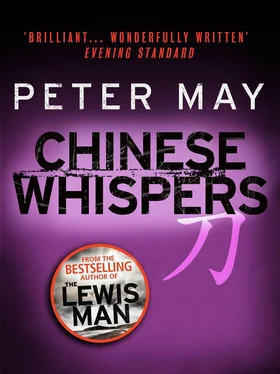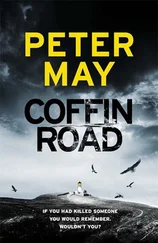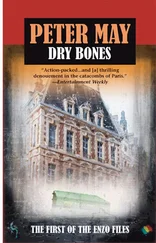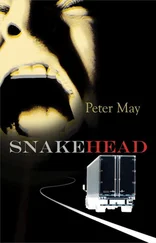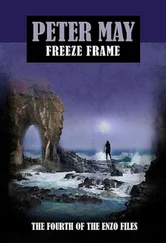Peter May - Chinese Whispers
Здесь есть возможность читать онлайн «Peter May - Chinese Whispers» весь текст электронной книги совершенно бесплатно (целиком полную версию без сокращений). В некоторых случаях можно слушать аудио, скачать через торрент в формате fb2 и присутствует краткое содержание. Год выпуска: 2012, Жанр: Триллер, на английском языке. Описание произведения, (предисловие) а так же отзывы посетителей доступны на портале библиотеки ЛибКат.
- Название:Chinese Whispers
- Автор:
- Жанр:
- Год:2012
- ISBN:нет данных
- Рейтинг книги:4 / 5. Голосов: 1
-
Избранное:Добавить в избранное
- Отзывы:
-
Ваша оценка:
- 80
- 1
- 2
- 3
- 4
- 5
Chinese Whispers: краткое содержание, описание и аннотация
Предлагаем к чтению аннотацию, описание, краткое содержание или предисловие (зависит от того, что написал сам автор книги «Chinese Whispers»). Если вы не нашли необходимую информацию о книге — напишите в комментариях, мы постараемся отыскать её.
Chinese Whispers — читать онлайн бесплатно полную книгу (весь текст) целиком
Ниже представлен текст книги, разбитый по страницам. Система сохранения места последней прочитанной страницы, позволяет с удобством читать онлайн бесплатно книгу «Chinese Whispers», без необходимости каждый раз заново искать на чём Вы остановились. Поставьте закладку, и сможете в любой момент перейти на страницу, на которой закончили чтение.
Интервал:
Закладка:
The crowd parted, like the Red Sea, to let Li and the entourage through to the champagne. The Minister raised his glass and proposed what Margaret took to be a toast. She heard Li Yan’s name, and along with the others she raised her glass and repeated it. The Minister then made a short speech to which everyone listened attentively.
‘What’s he saying?’ Margaret whispered to Dai.
‘Oh, he’s just talking the usual shit,’ said the old man.
Applause marked the end of the speech, and the leading entourage and guests of honour started to make their way through to the auditorium. Lao Dai took Margaret’s arm to steady himself, and Xinxin held her hand, and they followed the crowd downstairs and into the first level of the auditorium where nearly four thousand people were already seated. There were another three thousand on the second floor, and more than two thousand on the top.
The stage was vast, each side draped with long red flags. Margaret, Dai and Li’s family took seats reserved for honoured guests near the front and found themselves almost on a level with the stage. The lights dimmed and there was a fanfare of martial-sounding music, and a visual presentation began, projected on to a large screen disclosed by a rising curtain. There was a voice-over commentary, images of police officers at work: in offices and cars, catching criminals, giving evidence in court. Some flickering archive footage showed early police officers in green army uniform performing military-style drill outside a police station. The film cut to a modern police station with a well-equipped gymnasium and basketball court, and showed smartly dressed officers in their new black uniforms standing cheering a police football team. Then there was news footage of Li Yan leading a man in handcuffs out of an impressive-looking building. Margaret recognised the man as the former deputy mayor of Beijing whom Li had arrested for fraud and corruption. It had been one of the most high profile cases of the last few years. The deputy mayor had been found guilty and sentenced to death, which would mean a bullet in the back of the head. He was currently awaiting the outcome of an appeal that would reduce his sentence to life imprisonment if successful.
The music soared and swooped, switching from martial to classical and back again. It ended as suddenly as it began and everyone dutifully clapped. A curtain fell, and an officer in uniform walked out to a microphone in centre stage and made a short speech. ‘More shit,’ Dai whispered to Margaret, and then the Minister of Public Security walked out to thunderous applause. As the applause died away, he took out a sheaf of notes from an inside pocket and embarked on a speech which lasted nearly fifteen minutes. The Chinese were fond of making speeches. Margaret looked at Dai, but he just shook his head. ‘You don’t even want to know,’ he said.
Margaret looked about her and saw TV cameras strategically placed around the hall, recording the entire ceremony. It was probably going out live on one of the China Central TV stations. A phalanx of press and official photographers was clustered around the front of the stage, cameras flashing. Most of the invited guests would be police officers and their families, she thought, or people employed directly or indirectly by the Ministry — a strange brotherhood to which police everywhere seemed to belong.
The Minister finished his speech, to more applause. An elaborate table draped in red silk had appeared from somewhere — Margaret had not seen it brought on — displaying a wooden shield bearing the red, blue and gold crest of the Ministry of Public Security. The police badge. Beijing Police Commissioner Zhu walked on to shake the Minister’s hand and take up a position in front of the microphone. His rimless glasses caught and reflected the light, and you could not see his eyes. It made him appear oddly sinister, tall and thin and sightless. He waved a hand towards the shield and began speaking.
Dai whispered, ‘He’s talking about Li, now.’ He listened for a bit and then said, ‘He does not much like our young friend.’
‘You mean, Li?’
Dai nodded. ‘He is full of praise. Noisy praise, like a drum with nothing inside it. He says only good things of Li Yan. His tone is honeyed, but there is vinegar on his tongue.’
Margaret glanced around. If Commissioner Zhu’s words were having that effect on other members of the audience there was nothing in their faces to show it. The Minister beamed happily at the Commissioner’s side, and Margaret wondered if perhaps Lao Dai was reading more into the speech than was intended. And yet she knew that he was a clever man, experienced and perceptive. It gave her cause for disquiet.
Dai said, ‘I knew him when he was a rookie cop and I was Section Chief. I didn’t trust him then. Look at his face. There is the weasel in it.’ And there was, indeed, something weasely about his face, Margaret thought. He was not the usual pan-faced Chinese. He had a weak, receding jaw, and a forehead that sloped steeply back from his brow. ‘He is like a bellows. Empty when at rest, and full of air when set in motion.’ Dai chuckled. ‘In his case, hot air.’
Zhu finished his speech, and with a flourish stood aside, extending his arm towards the wings to welcome Li on stage. As Li walked briskly to the table to accept his award, he received a standing ovation, almost as if the guests had been briefed. As she herself stood, Margaret wondered if it had been stipulated on their invitation cards. Li took the shield from the Minister, shaking hands with both men. So many cameras flashed the stage was transformed into something like a scene from an old black and white movie, too few frames making the picture flicker and jerk and run too fast. The papers would be full of it tomorrow, and there would be plenty of images to choose from for the hoardings around the city.
Li cleared his throat as he approached the microphone, but spoke in a strong, clear voice.
‘Do you want to know what he is saying?’ Dai whispered.
Margaret shook her head. She had schooled him in his speech, persuaded him to reduce it from more than ten minutes to a little over three. She knew it by heart. His acceptance of the award not for himself, but on behalf of all his fellow officers. The need for the police in China to move forward, embracing new ideas and new technology to fight the rising wave of crime that was coming with increased prosperity.
His speech was met with yet another standing ovation, and Li walked off with the others as the curtain came down to a loud reprise of the martial music which had kicked off the whole proceeding.
‘Well, thank God that’s over,’ Margaret said. ‘Where’s the food?’
Old Dai grinned. ‘In the Sichuan Room,’ he said.
* * *
The Sichuan room was at the bottom of a flight of stairs, beyond the empty and forlorn-looking Taiwan Room. It was clad entirely in white marble, pillars, walls and floor, beyond a huge tapestry of a Sichuan forest scene. Tables for a banquet were set out on a pale Chinese carpet. Ten tables, ten to a table. Only special invitees were to be fed in the company of the principal guest of honour. A four-man troupe of Sichuan folk musicians played discreetly at the far end of the room.
Li Yan’s family and Lao Dai were escorted to a table near the door. To her surprise, Margaret found herself being seated at the same table as Li, along with the Minister and his deputy, the Commissioner and his deputy, and their wives. She leaned towards him and said in a stage whisper. ‘How did you manage this?’
The Minister said in impeccable English, ‘He told us that if he couldn’t have you at our table, he would take you for a McDonald’s instead.’ There was no trace of a smile as he spoke, but something in his eyes told Margaret he was not as po-faced as he appeared.
Читать дальшеИнтервал:
Закладка:
Похожие книги на «Chinese Whispers»
Представляем Вашему вниманию похожие книги на «Chinese Whispers» списком для выбора. Мы отобрали схожую по названию и смыслу литературу в надежде предоставить читателям больше вариантов отыскать новые, интересные, ещё непрочитанные произведения.
Обсуждение, отзывы о книге «Chinese Whispers» и просто собственные мнения читателей. Оставьте ваши комментарии, напишите, что Вы думаете о произведении, его смысле или главных героях. Укажите что конкретно понравилось, а что нет, и почему Вы так считаете.
